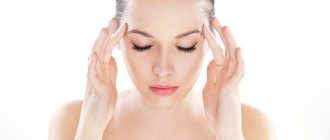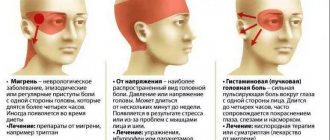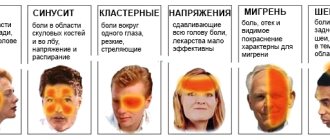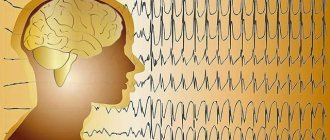Darkening in the eyes that occurs when changing body position is a symptom that is usually associated with various pathologies. However, it is not always a danger signal: even a healthy person’s eyes darken if they are overworked, under stress, or overdo it with physical activity. Most often, this symptom occurs when standing up.
Discomfort can be a single manifestation or recur regularly. Episodic darkening of the eyes in most cases does not indicate visual impairment; rather, it is a short-term deterioration in visual perception of the surrounding world. The exact cause of darkening in the eyes can be determined by a doctor after conducting diagnostic examinations.
Symptoms
Often therapists encounter complaints about the occurrence of such a condition. Basically, they are redirected to neurologists, cardiologists, and sometimes an otolaryngologist or endocrinologist can sort out the problem. There are times when dizziness is a harmless and natural phenomenon. For example, when an unpleasant feeling occurs when traveling in public transport, or when riding on attractions. There is only one reason for my dizziness - motion sickness.
During a sudden change in the location of the body, the plane in which a person is located, the vestibular apparatus does not have time to adapt and suffers a short-term failure. This is considered the norm. But if your eyes become dark at the slightest movement, or if your eyes become dark frequently, you should understand the reasons, because in this way the body is trying to tell you about the presence of some problems.
Many people often don’t know what to do if they feel dizzy. The sensations that arise are difficult to confuse with others. The ground simply disappears from under your feet. Sometimes they say that the blood drains from the head. There's actually something else going on. The vessels responsible for supplying the brain with blood undergo spasms, causing oxygen starvation. There is a lack of the required nutrients required for the normal nutrition of the whole body in general and the brain in particular.
Sometimes severe dizziness and darkening of the eyes are complemented by a combination of symptoms:
- it becomes suddenly dark in the eyes, fog appears;
- pressure drops;
- blocked ears;
- starts to feel sick;
- headache appears.
Some feel dizzy and have darkness in their vision for no more than a couple of seconds, but there are attacks that are much longer. They can occur during times of stress, excitement, or increased adrenaline levels.
What should be done to alleviate a person’s condition
The teenager rebels, tries to enter society, try everything that is forbidden. Often in adolescence, girls try to smoke and use psychotropic substances, which ends not only in dizziness.
The increasing workload at school contributes to fatigue and mental overload. Physical stress is added, associated with too rapid growth of the body. Unjustified diets have a negative impact on a girl’s body.
In adolescence, girls begin their menstrual cycle, that is, hormonal changes occur that do not go away asymptomatically. During this period, the child must be closely monitored. To eliminate dizziness, it is necessary to find out the true causes of its occurrence. Self-medication is not recommended.
Important! If dizziness recurs too often, you should consult a therapist and neurologist.
Vestibo - a drug for dizziness
For treatment, doctors may prescribe the following drugs:
- anticholinergics: Scopolamine, Atropine (improves neuromuscular transmission of impulses);
- antihistamines: Meclizine;
- neuroleptics: Meterazine;
- antiemetic drugs: Cerucal;
- vasodilators: Vasobral, Nicotinil (they help dilate blood vessels and normalize blood flow);
- benzodiazepines: Diazepam (they are necessary to calm the nervous system and produce a mild hypnotic effect);
- vestibulolytic agents: Promethazine;
- Glucocorticosteroids: Hydrocortisone (hormonal agents that help eliminate inflammation).
You should not get carried away with taking all these drugs. The combination of drugs must be correct. It is better not to use them on your own, so as not to worsen your own condition.
It is important to carry out competent vestibular rehabilitation. Specialists use methods to reduce a person’s dependence on somatic and sensory stimuli and help restore normal coordination of movements.
The patient will also need breathing exercises, which will eliminate the problem of hyperventilation. It is also important to follow a proper diet and review your diet. It is better to exclude coffee, strong teas, fatty and smoked foods.
To prevent relapses, a woman needs to change her lifestyle: relax more, walk in the fresh air, go swimming or cycling. Folk remedies can also help cope with dizziness, but they should be used with the permission of a doctor. Ginger tea, carrot and beet juice help well.
If attacks recur frequently and their intensity increases, you should definitely consult a therapist and neurologist. In particularly difficult cases, call an ambulance.
Diagnosis of the disease
In this case, he needs to be brought to his senses. Do this using ammonia vapor. You need to take a cotton swab, moisten it with ammonia and bring it to the person’s nose.
Usually, it is enough to hold the cotton wool against the patient’s nose for a few seconds and he will regain consciousness.
This method can be implemented even if the patient’s mind is clouded. In this condition, ammonia vapor will help him regain consciousness.
The best preventive measure for headaches is a walk in the fresh air. It is important for every person to breathe fresh air every day to stay healthy.
Causes of dizziness and darkening of the eyes
The causes of dizziness and darkening of the eyes abound. The most common among them are the following:
- Increased adrenaline levels. When under stress or sudden heavy loads, your head may become dizzy. This includes abruptly getting out of bed and other changes in body position, speaking in front of a large audience.
- Rising to great heights. If your ears are blocked, it may be due to elevation to a high altitude. The reason here is a violation of self-awareness in the surrounding space, sometimes there is an acute release of adrenaline.
- Diet. The main nutrient for our body after oxygen is glucose. With long-term diets, the amount of it in the body decreases, and it becomes impossible to properly nourish all organs and systems. Many useful substances are drawn out from fatty deposits, but this process is long, the influx of useful substances is not obtained constantly, only in periods.
- Doing exercise or exercise. If you are insufficiently physically trained, you should not start playing sports suddenly, subjecting your body to heavy stress. Sudden movements can cause blurred vision. You need to start with a minimum load, gradually increasing it to the required limit.
- Focusing your gaze on an object for a long time. When examining an object for a long time from a minimum distance, the eye muscles begin to overwork, and lack of nutrition in the eyeball appears. If you consider distant objects, the effect can be the same. It is necessary to rest the eyes so that the condition stabilizes.
- Carrying out drug treatment. Medicines often cause side effects, one of them being dizziness. A similar effect is observed with strong tranquilizers, antiseptics, and some antibiotics.
The reasons why your head feels dizzy and your vision begins to darken are varied. Dizziness may occur due to certain diseases. In this case, there will be other signs characterizing the existing disease. List of diseases whose symptom is dizziness:
- Vegetative-vascular dystonia. Suddenly there is dizziness, pain in the temples and the back of the head. Sometimes there is pain in the eyes and pressure surges. The causes of this disease: constant stress, frequent and sudden physical activity, severe overwork, problems with the endocrine system.
- Migraine. This type of headache is different from the standard one and cannot be confused with anything else. The reasons for its appearance have not yet been fully studied. Turbidity, nausea appear, the ears begin to ring, and sharp pains appear in different areas of the head. One of the important symptoms of the disease is the appearance of a negative reaction to light and noise.
- Otitis. Severe pain appears in the ears. A blocked ear canal is common in this disease. Not everyone feels dizzy; it is an additional symptom. If your ear begins to clog, you should contact an otolaryngologist.
- Diseases that affect the inner ear. Accompanied by changes in the functioning of the vestibular apparatus. There are other symptoms: blood pressure increases, nausea begins, and vomiting appears. Sometimes cold sweat appears.
- Cervical osteoporosis. The required amount of blood does not flow to the head, so dizziness occurs when sudden movements occur.
- Cancer. The changes produced by the disease can cause disruption of the functioning of individual organs, causing dizziness.
- Head injuries. During injuries, many processes are disrupted, which is why symptoms arise.
When should you sound the alarm?
Most often, the problem of dizziness and darkening in the eyes is encountered with severe orthostatic hypotension. This terrible term is usually understood as manifestations of certain somatic and neurological pathologies.
The main symptom of orthostatic hypotension is a sharp drop in blood pressure to minimum levels. Doctors associate its appearance with a change in a person’s position, for example, when he gets out of bed after sleep. The severity of this disorder may vary.
In its mild form, the patient complains of a condition resembling presyncope. At the same time, he becomes dizzy, his vision darkens, and nausea appears. The fear of losing consciousness gradually develops.
In severe forms of the disorder, the appearance of psychosensory disturbances is observed. The intensity of the symptoms listed above increases markedly. A drop in blood pressure often ends in actual fainting. The duration of such an attack is about 20 seconds.
Among other reasons influencing the occurrence of the disorder, doctors identify:
- Vegetovascular dystonia. In this case, patients complain not only of dizziness, but also of severe headache. Discomfort is most often localized in the temples and back of the head.
- Cervical osteochondrosis. The disorder usually manifests itself in the morning and evening hours. Dizziness worsens when turning the head, tilting the body, or sudden changes in position.
- Migraine. Patients who are already familiar with migraine first-hand are rarely interested in why they feel dizzy. In them, this symptom is usually accompanied by tinnitus, nausea, photophobia and other ailments.
- Diseases of the inner ear caused by dysfunction of the vestibular apparatus.
- Traumatic brain injuries.
- Cancerous tumors of varying severity. In this case, patients experience darkening of the eyes and dizziness almost every day.
- Inflammatory processes of the inner ear. For example, otitis media is accompanied by congestion in the ear, severe headache and impaired consciousness when changing body position.
- Cataract. The disease is characterized by impaired visual acuity. Always requires surgical treatment, since taking medications does not give the desired result.
- Trigeminal neuralgia. This pathology is indicated by cloudiness in the eyes. Its treatment should be started as soon as possible to prevent the development of negative consequences. Therapy most often comes down to taking antibacterial agents.
If you feel dizzy and there is a constant blur before your eyes, you need to seek qualified medical help. Such symptoms should not be left without due attention. After a complete examination, the doctor will be able to make a diagnosis and recommend concomitant therapy.
Treatment
It is difficult to say without examining a doctor why you feel dizzy. If you have a disease that causes dizziness, you should follow a special regimen prescribed by your doctor and perform the required procedures. Moderate physical activity is mandatory and stress exposure is limited.
If the disease is severe, non-drug treatment should be discontinued. If there is no illness, and the cause of poor health is overwork and other similar factors, you can do the following:
- massage of the head and back of the neck;
- acupuncture;
- hydromassage, take a therapeutic bath;
- influence by physiotherapeutic methods.
Blurred vision and dizziness may be short-lived. In this case, there is no need to worry; for prevention, you should consult a doctor. But if such a condition becomes systemic, it is important to seek help as soon as possible.
Stroke is another cause of the disorder
Sometimes darkening in the eyes reflects a temporary condition of a person, which in the near future, with correctly taken measures, will most likely end happily and be forgotten, although individual cases may require special attention and a visit to the doctor:
- Pregnant women often experience tinnitus, dark vision and dizziness - these symptoms are also caused by a drop in blood pressure. It is clear that pregnancy is a physiological condition, however, it should be borne in mind that the woman’s body undergoes certain changes, for which fainting can hardly be a positive factor, because the child’s brain also experiences hypoxia, the woman can get injured and, finally, more frequent episodes of darkening in the eyes can indicate the development of complications (gestosis);
- Without weakness and darkening in the eyes, it is difficult to imagine dehydration of the body and a decrease in the volume of circulating blood as a result of poisoning (then first darkens in the eyes and nausea, and then vomiting and/or diarrhea begins). Of course, in this case, it is not the dark curtain that appears before the eyes that is treated, but the cause that led to the appearance of this symptom;
- Darkening in the eyes is characteristic of acute blood loss, both with extensive wounds and when performing a noble mission (donation), and in the latter case, the role is played not by the amount of blood lost, but by the speed with which it left the body;
- It darkens sharply in the eyes if you accidentally hit your head and get a bump (a person often receives such injuries, they are not dangerous to health, but every time the moment of contact with one’s own forehead or another part of the skull a dark curtain appears, against which multi-colored sparks fly Of course, more serious TBI (brain contusion, concussion) also cannot be avoided without the presence of the described symptom at the moment of impact; in some cases, darkness continues to appear after the injury;
- Infectious processes caused by various pathogens can give similar symptoms as clinical manifestations of a certain disease. It is not surprising if, during a flu epidemic, a person feels weak, darkened in the eyes, noise in the ears and... loses consciousness - this means that he is sick, he needs to take his temperature, put him to bed and call a doctor;
- The use of certain medications (diuretics, anti-depression drugs, ACE inhibitors and other drugs that dilate blood vessels and lower blood pressure), as well as an overdose of insulin in people with diabetes, or its rapid intravenous (with glucose) administration in the treatment of other diseases in non-diabetics – factors that can quickly create a black picture before your eyes.
DETAILS: How does a person feel with low blood pressure?
If you suddenly feel dizzy and your vision deteriorates sharply, you need to rule out a stroke. After all, these are precisely its first manifestations. In order not to waste time, it is better to call a team of medical workers.
In addition to those listed above, the following symptoms may indicate a stroke:
- slurred speech;
- severe strabismus;
- violation of facial symmetry.
The presence of at least one of these problems may indicate a stroke. The victim does not always have a headache. If attacks of this kind make themselves felt with regular frequency, it’s time to think about problems with cerebral circulation.
First aid
If a woman experiences frequent bouts of dizziness, she definitely needs to be examined. Only after the diagnosis has been clarified can any treatment begin.
But during an attack you can help yourself:
- If a person feels dizzy, it is better for him to lie down in bed and try to focus his gaze on a static object. In this case, the head should be higher than the level of the body. If it is not possible to take a horizontal position, then you should find a fulcrum and sit down. This will make it possible to avoid falling and injury.
- The victim needs to be provided with a good flow of fresh air. To do this, you need to unfasten or remove tight clothing.
- Sudden movements of the head and body will have to be excluded. Don't quickly change position or turn around.
- People suffering from frequent dizziness are not recommended to go to heights.
- If the attack is severe, the woman can be given 8-10 drops of Atropine solution.
You should never leave home without having breakfast. Even a light snack can help prevent an attack. Mint candy provides the same effect. You should always carry a piece of chocolate or other sweet in your bag so that you can normalize your blood glucose levels.
What should you do if the person standing next to you feels dizzy and has dark vision? First of all, it is necessary to call a team of medical workers, and only then begin to provide assistance.
You need to open the window slightly if you are indoors to provide access to oxygen. You can very carefully lay the victim on the ground, unfasten the clothes that are constricting the body, and try to calm him down.
Many people who find themselves in such a situation know the cause of the illness and can help with their story. For example, a diabetic will explain that he forgot or did not eat food on time. He needs to be given sweet water to drink and wait a little.
What is strictly forbidden to do? If a person has an acute headache, a veil before his eyes, he should under no circumstances be left alone. The victim's condition can quickly deteriorate and even result in death.
In addition, doctors do not recommend trying to correct the situation with available medications. Based on such symptoms, it is very difficult to correctly determine the cause of the disease. Self-treatment sometimes only worsens the clinical picture.
Treatment Options
Feeling dizzy can happen for many reasons. Therefore, you should not ignore this symptom. If its manifestations are also accompanied by darkening of the eyes, you should urgently seek help from a doctor. First, the doctor will prescribe a comprehensive examination of the body.
It usually includes MRI, ultrasound of the head and neck vessels, ophthalmoscopy and consultation with specialists. After this, the specialist will be able to determine the true diagnosis, which will determine further treatment tactics.
For example, therapy for vegetative-vascular dystonia comes down to taking sedative medications, a course of exercise therapy, and limiting stressful situations. In case of a protracted course of the disease, physiotherapeutic effects on the body, special massage of the collar area and acupuncture are additionally recommended.
Treatment of oncological pathologies is prescribed on an individual basis. Typically, the patient is prescribed radiation/chemotherapy, and, if necessary, surgery is required. For inflammatory processes in the inner ear, drug therapy is recommended.











